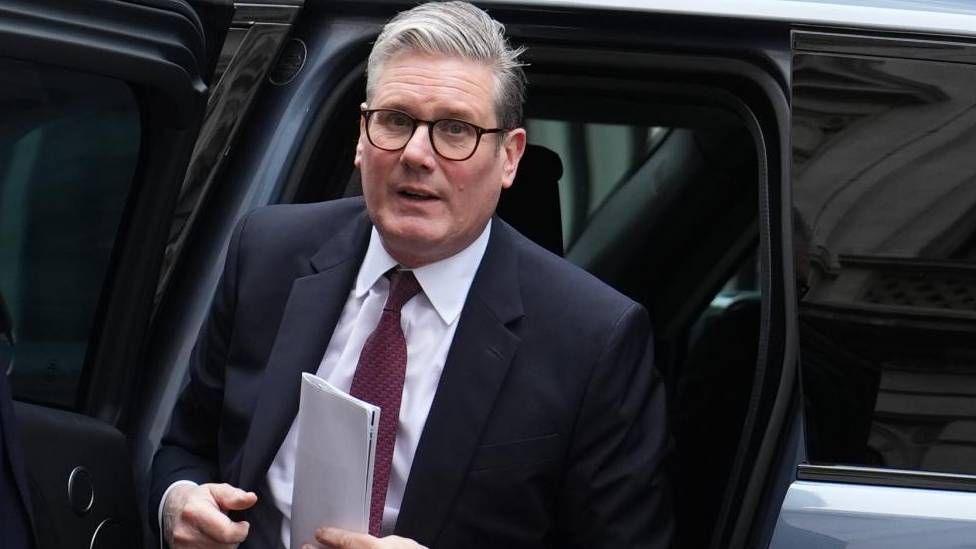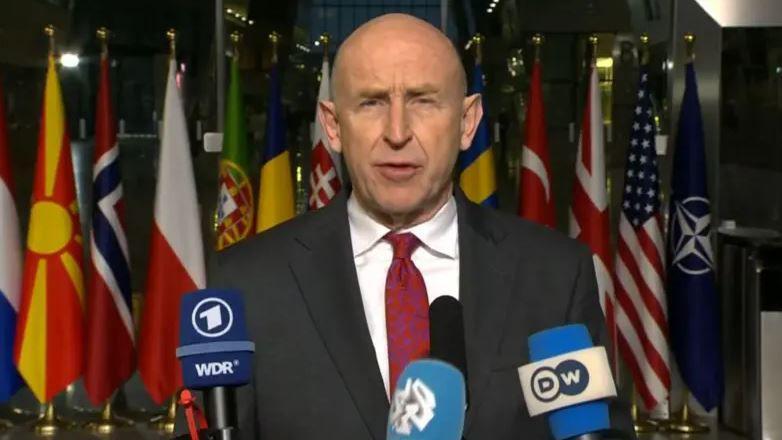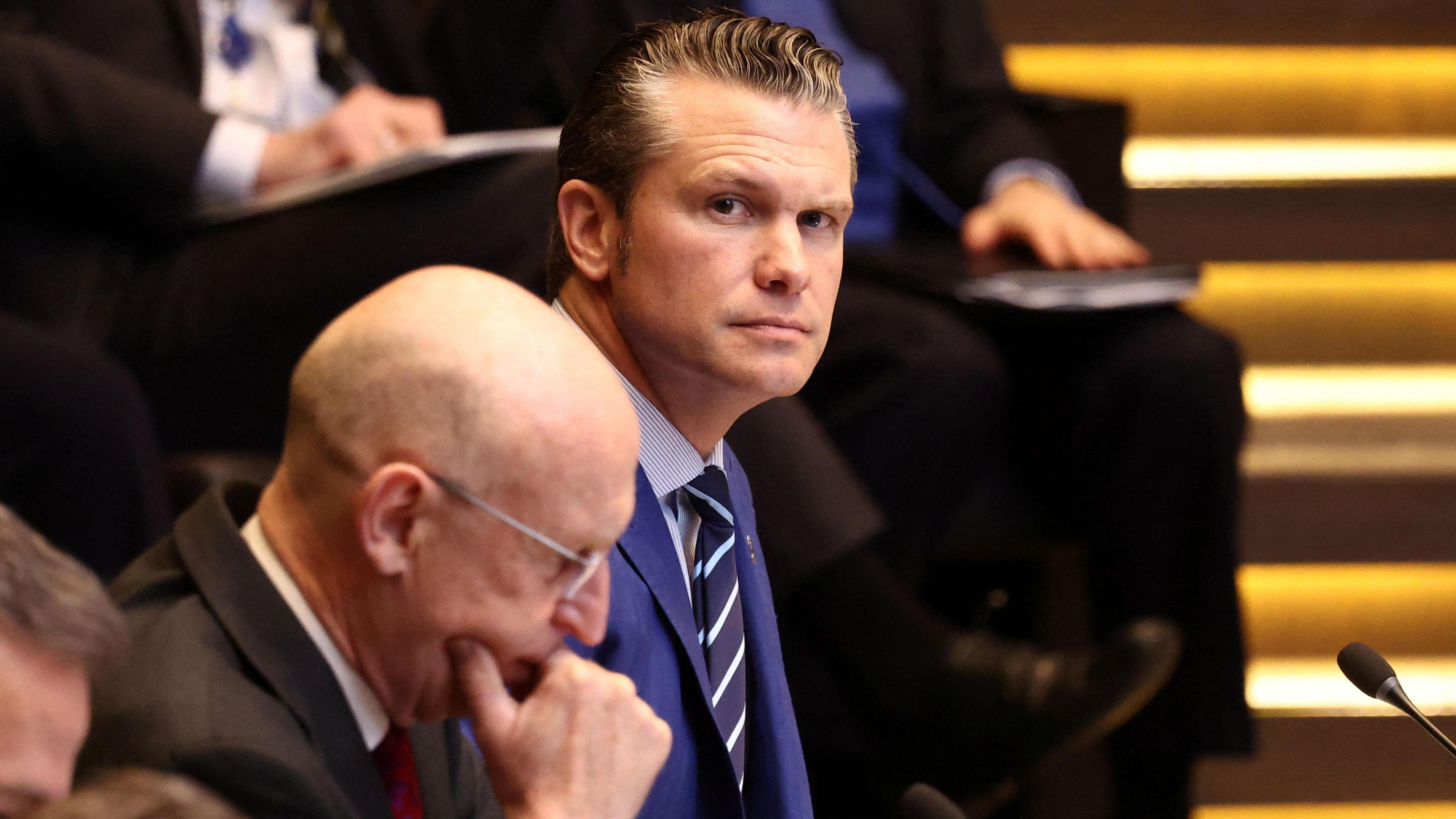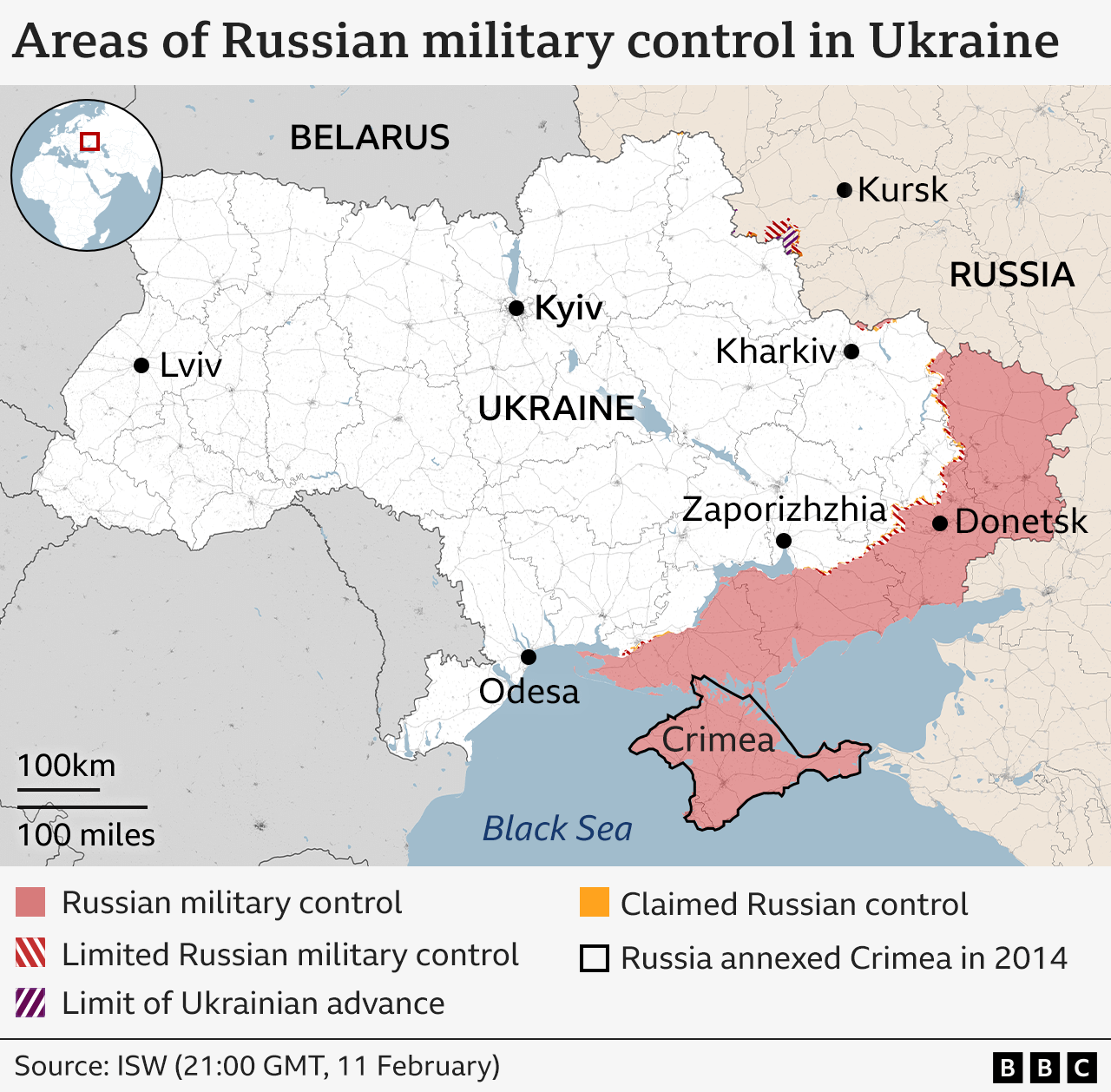Ukraine must be at heart of peace talks, PM says

The prime minister stressed the importance of Ukraine being in the "strongest possible position"
- Published
Ukraine must be "at the heart" of any negotiations to end the conflict with Russia, the prime minister has said.
Sir Keir Starmer said it is important Ukraine "is in the strongest possible position", whether that is "in discussions" or "continued fighting".
His comments come after US President Donald Trump and Russian President Vladimir Putin agreed to begin discussions to end the nearly three years of fighting.
Ukraine's president also stressed the need for Kyiv's involvement, as he said he would not accept any deal reached by Moscow and Washington in its absence.
"Today it's important that everything does not go according to Putin's plan, in which he wants to do everything to make his negotiations bilateral [with the US]," Volodymyr Zelensky said.
Kremlin spokesman Dmitry Peskov said Ukraine will "of course" take part in the negotiations, "one way or another", Russian state media reported.
"There will be a bilateral Russian-American track of that dialogue, and a track that will be associated with the involvement of Ukraine," Peskov said.
Sir Keir said the UK needed to "ramp up the money, the capability and the training" it has been giving to Ukraine, adding that his government was "delivering even more of that this year than we were last year".
Before a Nato meeting in Brussels he told reporters it was really important to put Ukraine in the "strongest possible position".
"This has to be done with Ukraine."
Last month, Sir Keir signed a "landmark" 100-year pact with the war-stricken country, building on the £12.8bn the UK's already sent to Ukraine, with further commitments of £3bn every year for "as long as it takes".
The prime minister's comments echo those of the UK's defence minister, who earlier warned there can be no negotiation "about Ukraine without Ukraine".
John Healey said: "We've seen the calls from President Trump overnight and we all want to see a durable peace and no return to conflict and aggression."
He added that Russia "remains a threat well beyond Ukraine".
It is becoming harder for Nato to keep a united front on Ukraine, with Trump's unilateral efforts to bring an end to the war.
In a post on his Truth Social platform, Trump said he and the Russian president had "agreed to have our respective teams start negotiations immediately".
He did not set a date for a face-to-face meeting with Putin, but later told reporters at the White House: "We'll meet in Saudi Arabia." He wrote on social media the pair had also invited each other to their respective capitals.
The head of Nato, Mark Rutte, is still trying to hold the line - saying allies must step up their military support for Kyiv and Ukraine must be involved in any peace talks. But in reality Washington is now making the calls.
That one phone call between Presidents Trump and Putin, due to be followed up by a meeting, has pushed Nato to the sidelines.
Some defence ministers are trying to convey the message that nothing has fundamentally changed and Healey has again repeated the familiar lines that Nato would remain focused on keeping Ukraine in the fight and "put them in the best position to secure a lasting peace through strength".

Healey said Nato allies had "heard a clear message from the US" about stepping up defence spending

US and UK Defence Secretaries Pete Hegseth and John Healey are at a Nato meeting in Brussels
In a speech on Thursday, US Defence Secretary Pete Hegseth called on European nations to shoulder more of Nato's defence spending, adding that Trump would not allow anyone to turn "Uncle Sam into uncle sucker".
On Wednesday, Hegseth said that the US attempts to negotiate peace between Ukraine and Russia was "certainly not a betrayal" of the Ukrainian soldiers who have been fighting against the invasion.
Addressing fellow defence chiefs later, he added that the US was "committed to expediting the process" of foreign military sales, to ensure "our allies get what they need when they need it".
Healey said the UK had "heard a clear message from the US about stepping up and we are", pointing out a new £150m package of military aid including drones, tanks and air defence systems for Ukraine.
"The Ukrainians are fighting bravely," said Healey. "Its our jobs as defence ministers here at Nato to put them in the best position to secure a lasting peace through strength."
The US indicated that it was unlikely Ukraine would return to its pre-2014 borders under a deal, while there was not a realistic prospect of Ukraine joining the Nato military alliance.
Nato members have previously pledged their support for an "irreversible path" to future membership for Ukraine.
But Nato solidarity and strength has been weakened by the clear message from Washington - that in trying to bring an end to the war, it is not prepared to bankroll military support for the Kyiv, or allow Ukraine to join Nato.
Nor does it believe Ukraine should expect the return of all its territory lost to Russia. It's a very different message.
Rutte is trying to salvage some credibility by urging allies to dramatically ramp up defence spending. That, he hopes, will build bridges and influence with Washington.
But President Trump has set a very high bar that few can meet – spending up to 5% of their GDP on defence. Most allies struggled to meet the 2% target set over a decade ago.
Commons leader Lucy Powell said the government was "committed to working towards" increasing its current spend of 2.3% of GDP to 2.5%.
She told the House of Commons that defence spending had been "too low to meet the strategic needs of our country in this context".
So far criticism of Donald Trump has been muted. But that carefully calibrated united Nato front on Ukraine – that has survived until now – is fraying. So are efforts to keep President Putin isolated as an international pariah.
The German Defence Minister, Boris Pistorius, has been braver than most. He said "he regretted" that the US administration had already made concessions to Russia before the talks had started.
